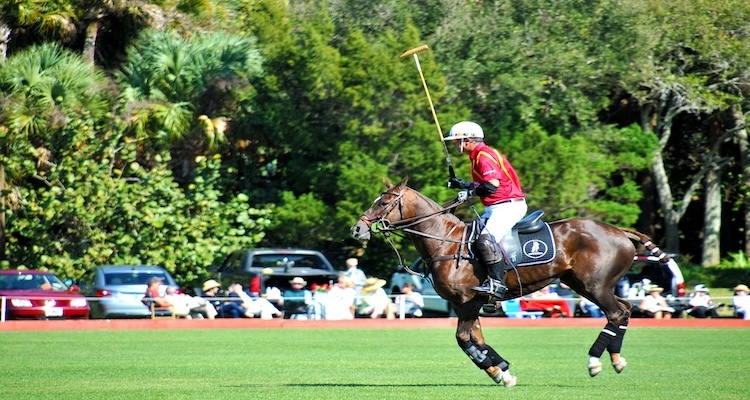
Polo is a dynamic equestrian sport steeped in tradition and adrenaline. Played on horseback, teams of riders use mallets to strike a ball, aiming to score goals against their opponents. The game requires skillful horsemanship, precise mallet control, and strategic teamwork. Originating in ancient Persia, polo has evolved into a thrilling modern sport enjoyed worldwide. Matches are typically played on a grass field, although variants such as arena and beach polo exist. Each match is divided into periods called "chukkas," usually lasting seven minutes, with breaks in between for horse changes. Polo combines elements of speed, strategy, and finesse, captivating both players and spectators alike with its fast-paced action and graceful maneuvers. Beyond its competitive aspect, polo embodies a rich social scene, often associated with high society and prestigious events, adding an extra layer of allure to this centuries-old sport.
Polo is a physically demanding sport that requires high levels of energy, strength, and endurance from its players. As such, maintaining proper nutrition is crucial to support their performance on the field and aid in recovery off the field. Here's an overview of the nutritional demands for polo players:
Polo matches are intense and can last for several chukkas, each requiring bursts of speed and strength. Players need to fuel their bodies with sufficient carbohydrates to provide energy for these high-intensity efforts. Carbohydrate-rich foods like whole grains, fruits, and vegetables should be a staple in their diet to ensure glycogen stores are adequately replenished.
Protein is essential for muscle repair and growth, making it crucial for polo players who engage in strenuous physical activity. Lean sources of protein such as poultry, fish, lean meats, eggs, and plant-based sources like beans and legumes should be included in their meals to support muscle recovery and maintenance.
Hydration is key for optimal performance on the polo field. Players can lose significant amounts of fluids through sweat during matches, leading to dehydration if not replenished adequately. It's essential for players to drink plenty of water before, during, and after matches to maintain hydration levels. Electrolyte-rich beverages can also be beneficial for replenishing electrolytes lost through sweat.
Polo players require adequate micronutrients to support overall health and optimize performance. This includes vitamins and minerals such as vitamin D, calcium, magnesium, and iron, which play crucial roles in bone health, muscle function, and oxygen transport. A well-balanced diet consisting of a variety of fruits, vegetables, whole grains, and lean proteins can help ensure players meet their micronutrient needs.
Prior to a match, players should consume a meal or snack that provides a balance of carbohydrates and protein to fuel their performance and support muscle function. After a match, it's important to refuel with a meal or snack rich in carbohydrates and protein to replenish glycogen stores and promote muscle recovery.
Players should aim to eat meals and snacks at regular intervals throughout the day to maintain energy levels and support recovery. Eating a balanced meal or snack containing carbohydrates and protein approximately 2-3 hours before a match can help fuel performance, while consuming a post-match meal or snack within 30-60 minutes after a match can aid in recovery.
Overall, proper nutrition is essential for polo players to support their performance on the field, promote recovery, and maintain overall health and well-being. By fueling their bodies with the right balance of carbohydrates, protein, fluids, and micronutrients, players can optimize their athletic performance and stay at the top of their game.
Because of this working with a sports nutritionist can be highly beneficial for polo players in optimizing their performance, recovery, and overall health. These professionals specialize in tailoring nutrition plans to meet the specific needs of athletes, taking into account the demands of the sport and individual player requirements. We now turn to explore why a sports nutritionist can be helpful for polo players.
A sports nutritionist can help polo players develop personalized meal plans that ensure they are meeting their energy, macronutrient, and micronutrient needs to fuel their performance on the field. They can also provide guidance on proper hydration strategies to prevent dehydration during matches.
Additionally, a sports nutritionist can offer valuable insights into pre- and post-match nutrition strategies, helping players optimize their meals and snacks to enhance performance and promote efficient recovery. They can also provide education on supplements, if necessary, to address any nutrient deficiencies or performance goals.
Overall, by working with a sports nutritionist, polo players can gain a competitive edge, maximize their potential, and maintain peak physical condition throughout the season.
We have a number of sports nutritionists who advertise their services on our site. Visit our homepage for our easy to use online directory to find a sports nutritionist near you.
